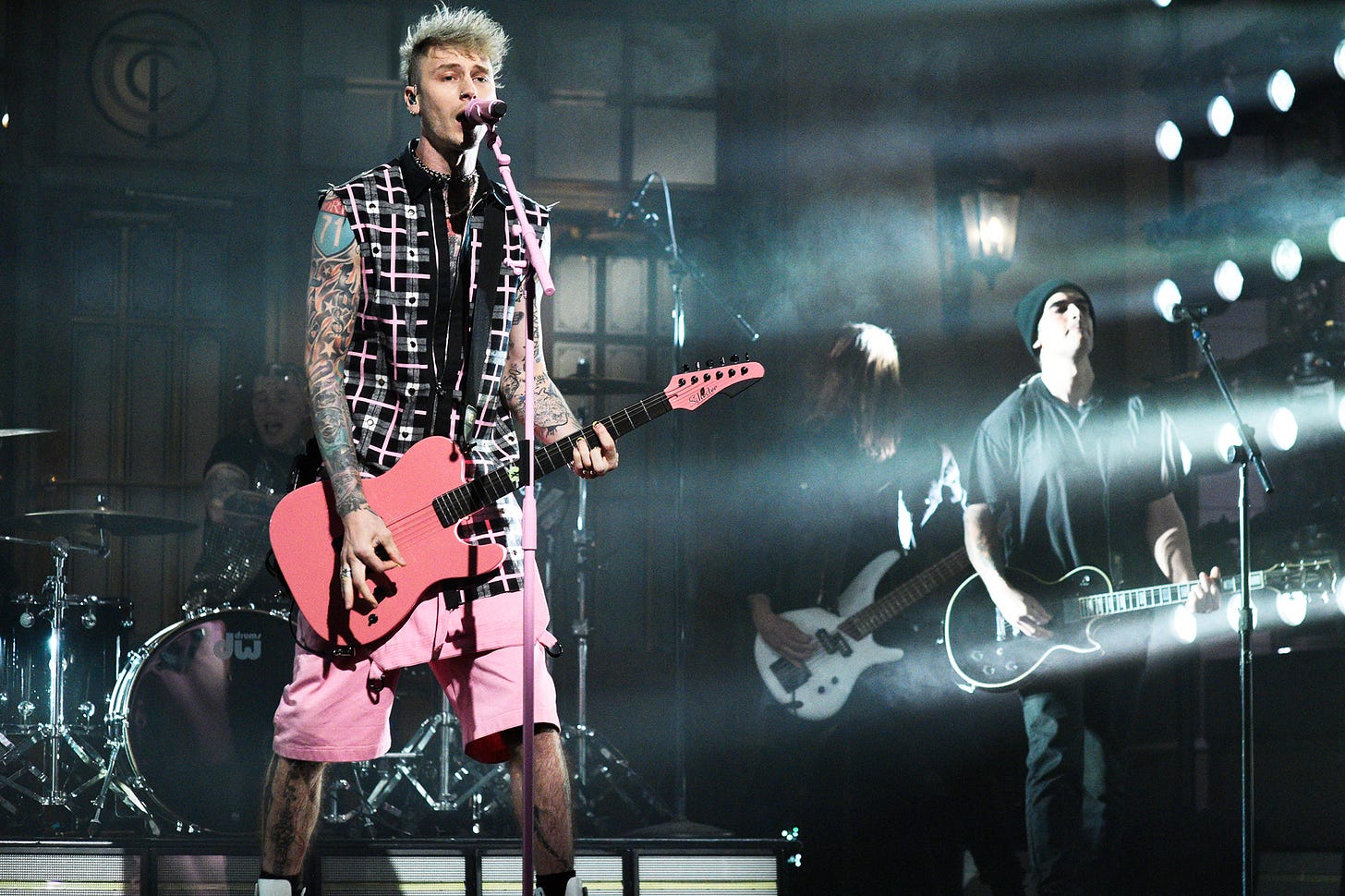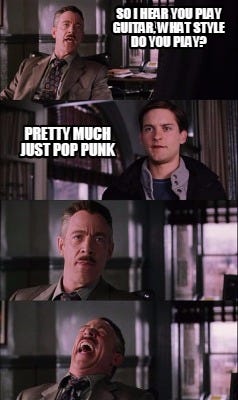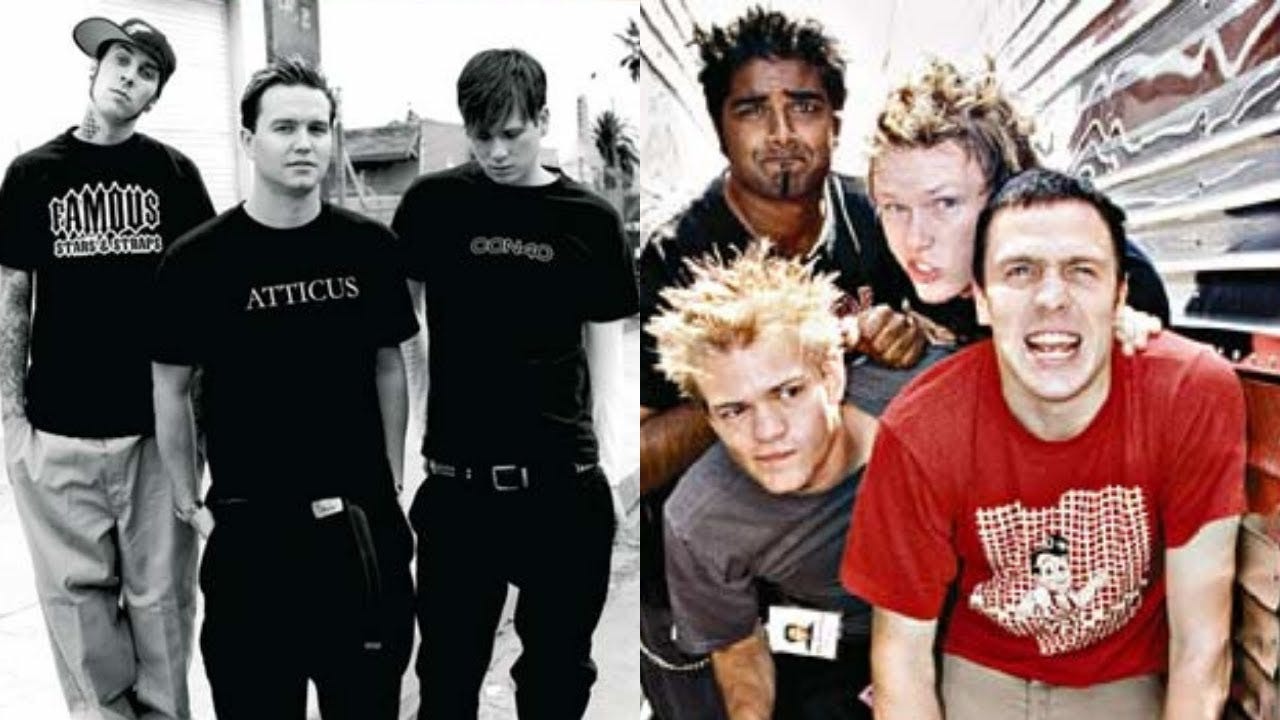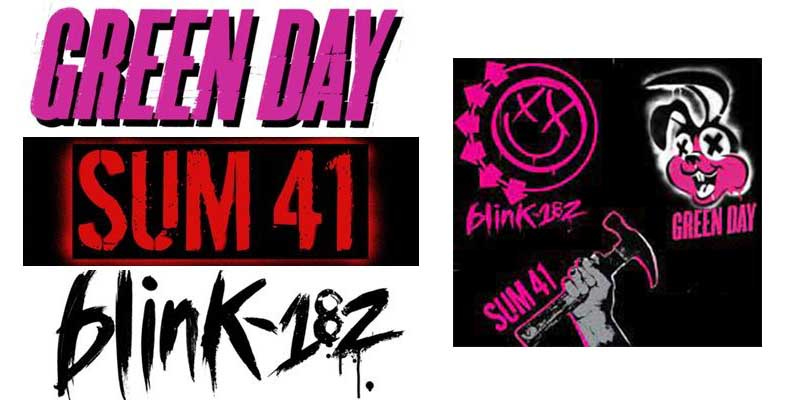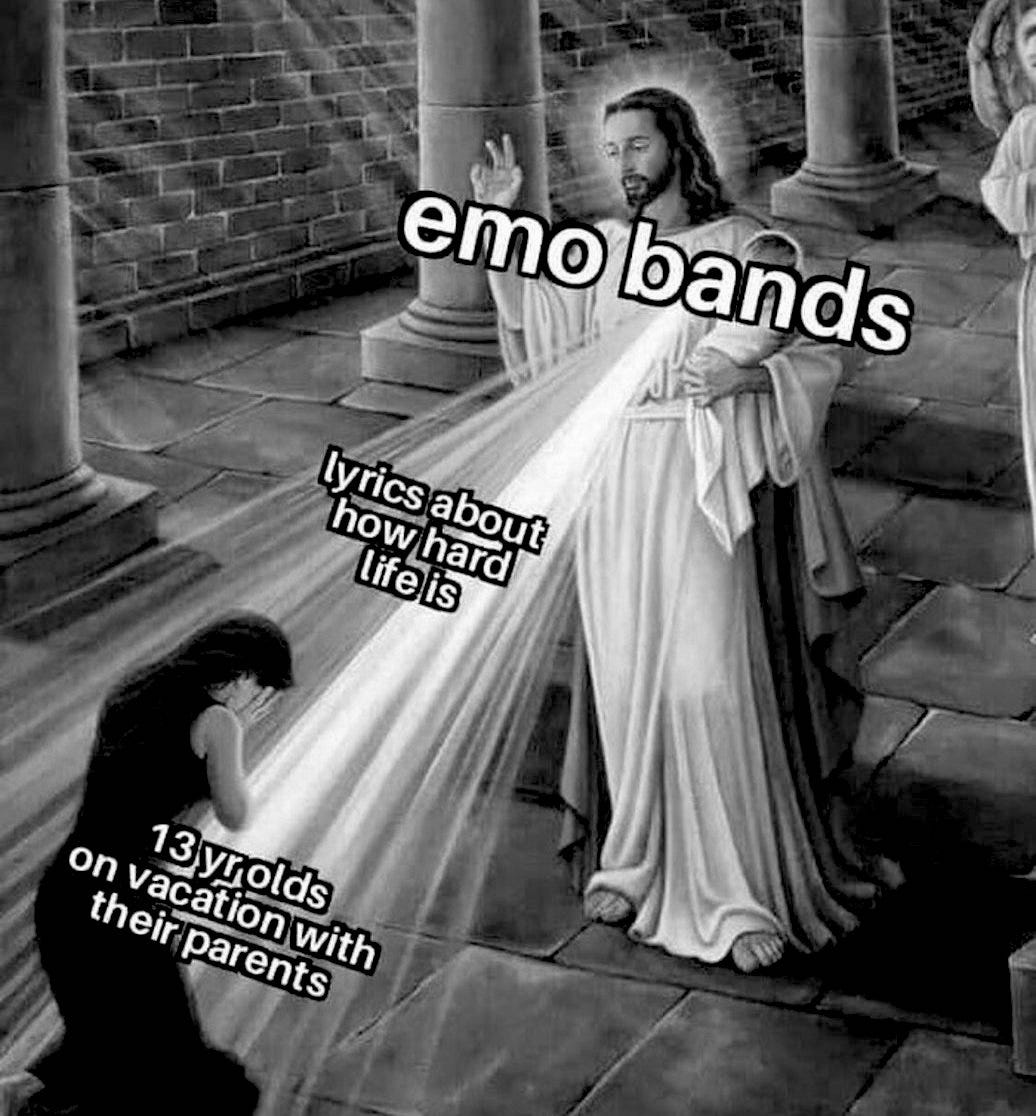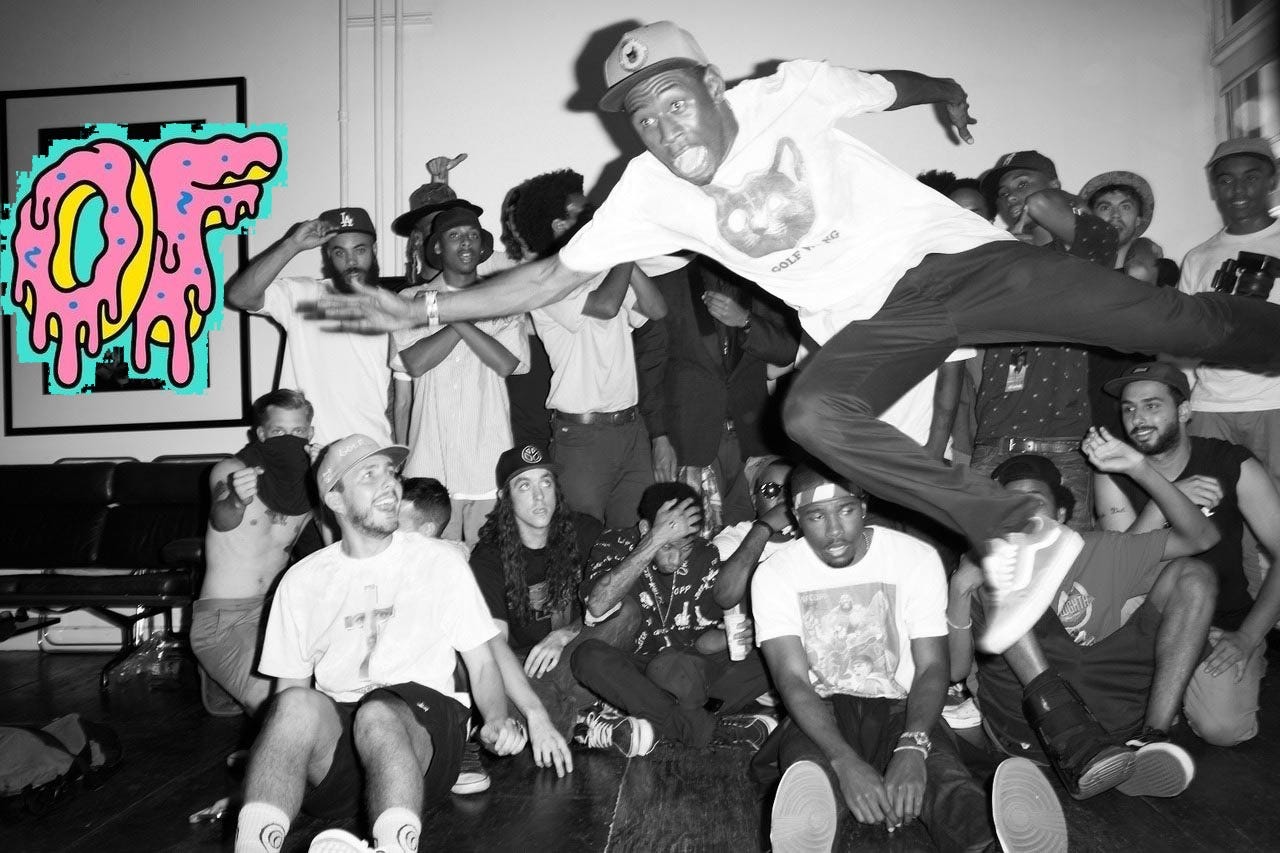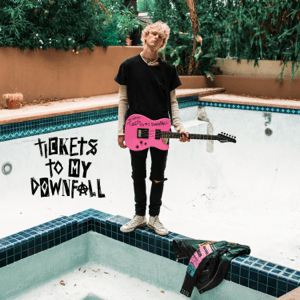Machine Gun Kelly is on a mission to ‘bring back pop-punk.’ Can guitar sounds make a comeback after the
total ubiquity of hip hop and rap?
From the Dispatches at NO FUN Magazine.
In Part I, we looked at Kid Cudi’s internet-breaking dress moment on Saturday Night Live (SNL) earlier this month. In Part II, we go further with the SNL musical guests, having noticed something brewing in (American) pop music that hasn’t happened in a long time. It’s strange that the common link here is SNL. Why would a long-running (maybe outdated) comedy sketch and variety show potentially be a present signal, a radar, of what is manifesting within pop music? Though perhaps the question is rather, why not?
I’ve found out that the musical guests are frequently considered the highlight of the show. Prior to Kid Cudi, Machine Gun Kelly (MGK) was the musical guest. MGK made his TV debut performing songs from his new/latest album Tickets to My Downfall. The upcoming musical guest is Miley Cyrus—stay with me here. These two are both in a similar lane atm, heading towards a place for pop music which has been abandoned by audiences and industry for many years. Let’s start with MGK.
Machine Gun Kelly: Rap Brat to Pop Punk
If you haven’t heard of MGK before this year, I’m not surprised. Homing from Cleveland in the US mid-West (like Cudi), MGK—whose real name is Colson Baker, born in 1990—began releasing rap mixtapes in 2007. He spit verses so fast that he earned the name Machine Gun Kelly when he was just 15. He rose fast, too. He was signed by Sean Combs to Bad Boy records after a strong showing at South by Southwest, and in 2012 released his debut studio album Lace Up that peaked at number four on the US Billboard 200, containing his breakout single ‘Wild Boy,’ featuring Waka Flocka Flame.
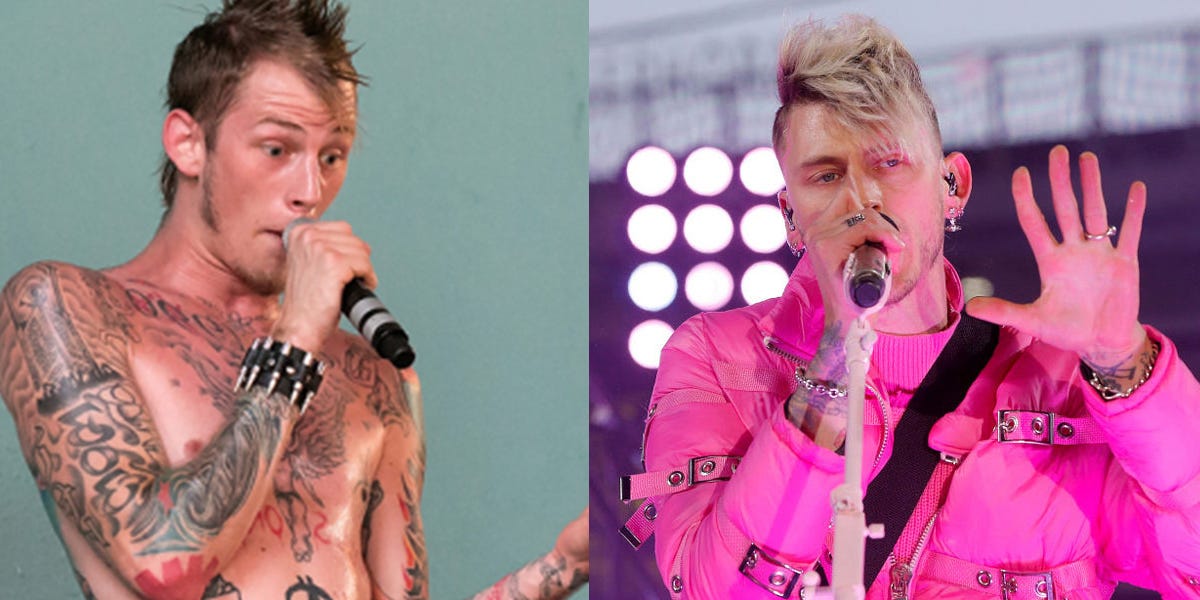 MGK: Then and Now
MGK: Then and NowMGK released a few more rap albums in 2015 and 2017, and in 2019 released Hotel Diablo, which was his first venture into ‘rap rock.’ He also had an infamous beef with idol Eminem (this is how many people came to know of MGK, though the feud has been an epic slow burn) and began acting—including roles in Bird Box (2018) and playing Tommy Lee in the Mötley Crüe biopic The Dirt (2019).
His musical trajectory didn’t start to get interesting until last year, with the release of his first pop punk album Tickets to My Downfall. Pop punk? Yes, the genre many felt was well over and out.
Who’s Ready for the Return of Pop Punk?
The last time pop punk had mainstream success was in the early 2000’s as bands like Blink-182 and Sum 41 carried over from the end of the 90’s, spinning out into Good Charlotte, Simple Plan, Avril Lavigne, and strong new albums from Green Day. Soon the pop punk momentum spawned into emo and neon-punk pop strands with platinum selling albums from bands like Fall Out Boy and Panic! at the Disco and Paramore, plus emo pop bands like Plain White T’s and My Chemical Romance garnering massive fandom.
Pop punk, as a hybrid kind of sub-genre of punk and form of pop music, is a genre known for being a “love to hate” situation. Green Day’s frontman Billie Joe Armstrong describes it as a child of power pop and “the greatest music on Earth that no one likes.”
Pop punk absorbs elements from new wave, college rock, ska, rap, emo, and boy bands—repackaging them into a highly sell-able, attractive to adolescents, mix of rebellious aesthetics and catchy tunes that hold “an open respect for the tradition and craft of pop song writing,” according to Vice’s Jason Heller. Pop punk transformed the ‘rawness’ of punk—it’s sound, politics, and immediacy—towards that of emotion and expressing the “spectrum of human experience” (hence the natural transition into emo.) The themes of suburbia, drugs, lust and rebellion are all there, in true resonance with high school life.
By the 2010’s, pop punk’s mainstream popularity began to wane. For me, this coincided with the rise in popularity of other forms of guitar music: such as Tame Impala’s Innerspeaker (2010) which brought back psychedelia, the formation of Warpaint and particularly the release of The Fool (2010), the emergence of Ty Segall (including big releases Hair, Slaughterhouse and Twins, all in 2012) and the hot bed of underground/garage bands coming out of the San Francisco Bay area, plus Mac de Marco’s Rock and Roll Nightclub and 2 (2012)—designated as “Best New Music” by Pitchfork.

This is just a handful of what was happening in guitar sounds during the first half of the 2010’s. It was more grown up than what had happened in pop punk, and kind of felt like the answer to ‘What happens after The Strokes?’ Kings of Leon had become safe and boring, but these scrappier (Ty Segall), more stoner (Mac de Marco), ethereal and jamming (Warpaint and Tame Impala) bands were hovering well around the border of what was cool, what was respected, what was new, and what was popular.
Music blogs were still a thing. The aforementioned Pitchfork had a place of authority (much critiqued albeit, and another ‘love to hate’ situation), smaller blogs like Gorilla vs. Bear were thriving go-to’s for new music, and platforms like Last.FM where user profiles used music taste to help one find new music/upcoming concerts (as well as check if potential dates had a profile and stalk if their musical preferences were compatible) were still active and helpful.
Fast forward to 2021 and virtually none of these remain, at least not in their prior forms. The entire ecosystem of music and online fandom has changed, and it seems that the popularity of guitar sound went with it—replaced with the rise of hip hop and rap to never-before-seen heights and ubiquity.
Until now.
Moving Towards Guitar Sounds (Again)
There was an in-between moment where the popularity of various forms of rock (garage rock, stoner rock, indie/alt rock, neo psych rock) became increasingly electronic and diverged into softer and more ambient styles, including shoegaze, chillwave, post-rock electronica, and dream pop. These were somewhat periphery to the major developments in hip hop which dominated the musical imaginary. Kendrick Lamar’s Good Kid, M.A.A.D City (2012) and To Pimp a Butterfly (2014) and the explosion of Odd Future and its crew of solo artists (Tyler the Creator, Earl Sweatshirt, and Frank Ocean—to name but three—were all happening (if that movement was to be designated a key platform, it would be Tumblr, which was also significant at the time)). This is where guitar music really took a back seat in the mainstream.
However, the reception of Machine Gun Kelly’s pop punk album Tickets to My Downfall appears to mark a turning point in the long dominance of hip hop’s popularity. Its critical reception and commercial performance have been astronomical. When asked by SPIN magazine “Why pop-punk and why now?” MGK replied:
“It needed a face again. It needed someone to walk up in the camera and go ‘fuck you.’”
The album debuted at number one on the US Billboard 200 all-format albums chart, and was the first rock album to top the chart since Tool’s Fear Inoculum in 2019 (did anybody hear of that?)
MGK has revealed himself as extremely strategic and clever in the decision making of his career, musical sound, choice of collaborators, and modes of manifestation. It seems you really have to be a genius to make pop punk relevant and popular again. Important to note is that the Tickets to My Downfall band and record includes Travis Barker of Blink-182 fame as drummer and producer (Barker and MGK have been friends for over a decade.) Barker appears to have never ceased being the walking embodiment of pop punk, almost as though he has been lying in waiting for this day of revival to come.
I sold some tickets
To come see my downfall
It sold out in minutes
I saw friends in the front rowThey’ll leave when I’m finished
And the lights in my name’s gone
‘Cause the ones who gas you up
Only come around when the flame’s on—From Title Track on Tickets to My Downfall
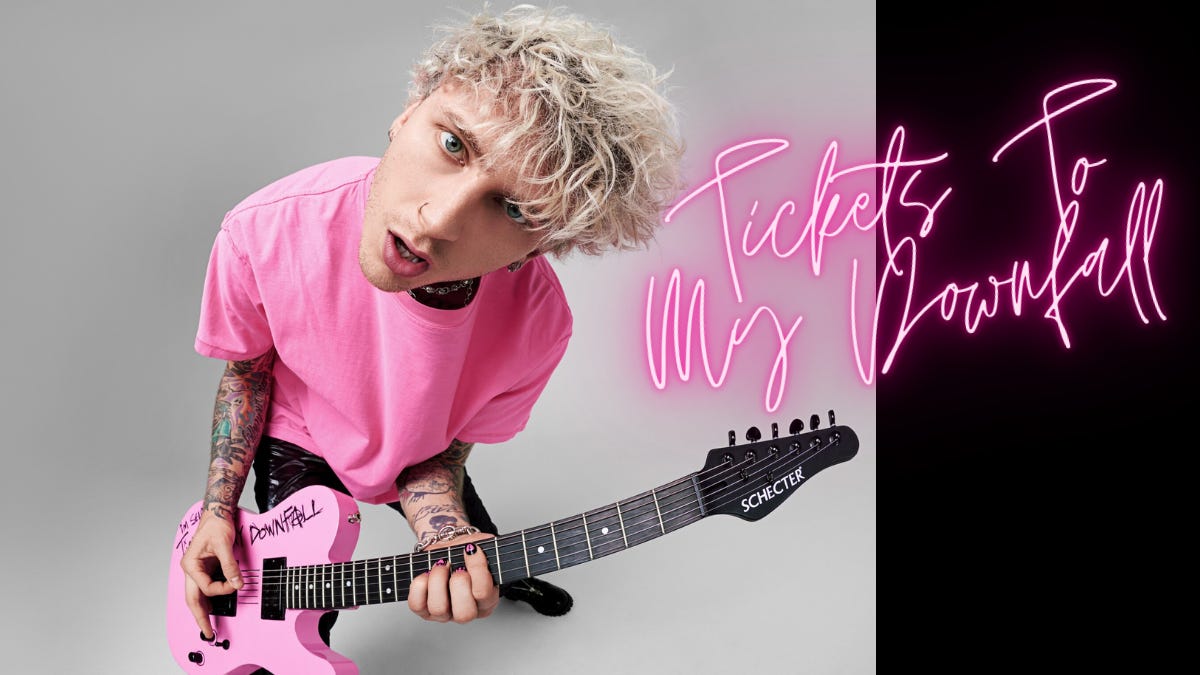
Perhaps it is MGK’s transition from rap to rock that has carried listeners with him from one genre to another. Like Kid Cudi, his focus on themes such as mental health, drugs (especially prescription medicines like Adderall, typically prescribed for conditions like ADHD), and loneliness resonate heavily with the youth of today. This seems to be a mingling of rapper lifestyle, emo hark backs, and general speaking-to the trials and tribulations of adolescence, high school, and the painful awkward transition into adulthood.
If I’m a painter, I’d be a Depressionist
I need this time to decompressFrom this ketamine, this cocaine
This medicine for my groin painThis weed I’ve been smoking, I’m dying inside.
— Continued from Title Track on Tickets to My Downfall
MGK proudly states that ‘If I’m a painter, I’d be a Depressionist’ might just be “the most emo lyric ever.”
And, from Candy feat. Trippie Redd:
Ayy, you know I keep that candy, yeah
I need more like Mandy, yeah
Stay up, take addies, yeah
I’m tryna fix this damage, yeah
The Music and The Musical
Tickets to My Downfall did not premier only as an audio album. In an interview with Allison Hagendorf on her Rock This With Allison Hagendorf Spotify podcast, MGK tells how he convinced his record label to give him a “ton of money” to make a musical out of the album. The Tickets to My Downfall musical is titled (and set in) DownfallsHigh. It follows the tale of two high school sweethearts through being ‘awkward losers’ at school, their falling into love, and an ultimate tragedy—all to the chronological soundtrack of Tickets to My Downfall playing start to finish. The aesthetic of the musical is very pastel, very pink, and heavily inspired by Grease 2.
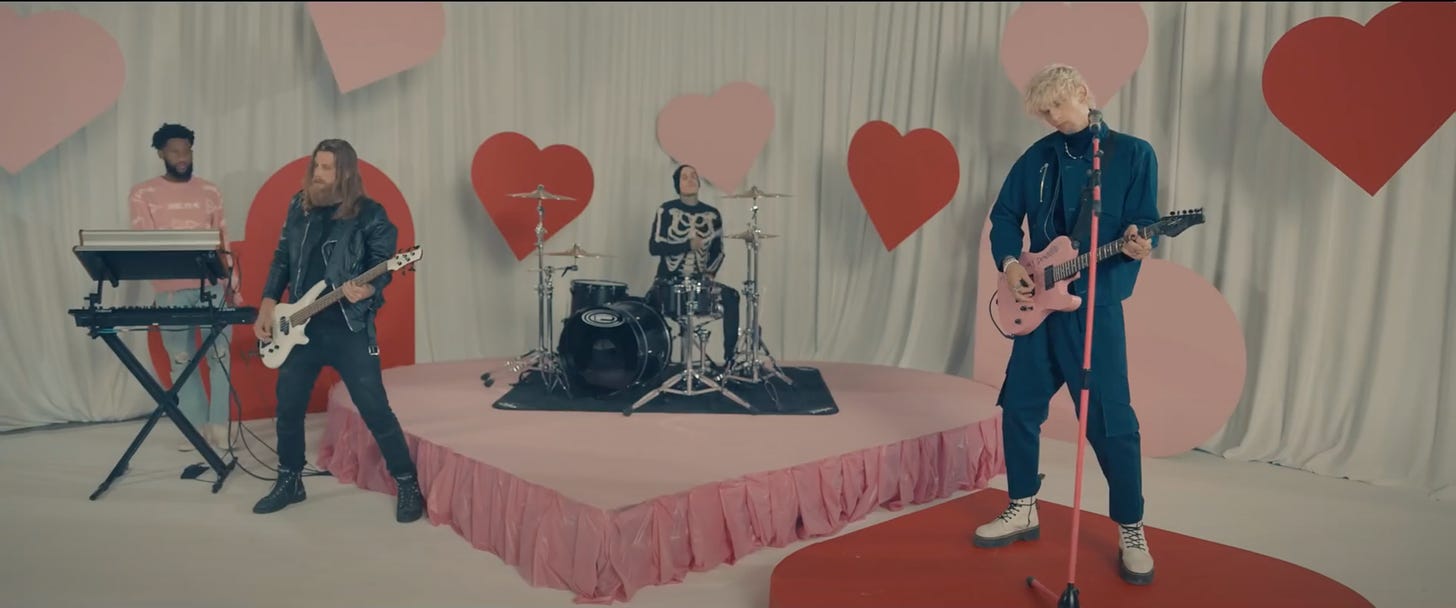
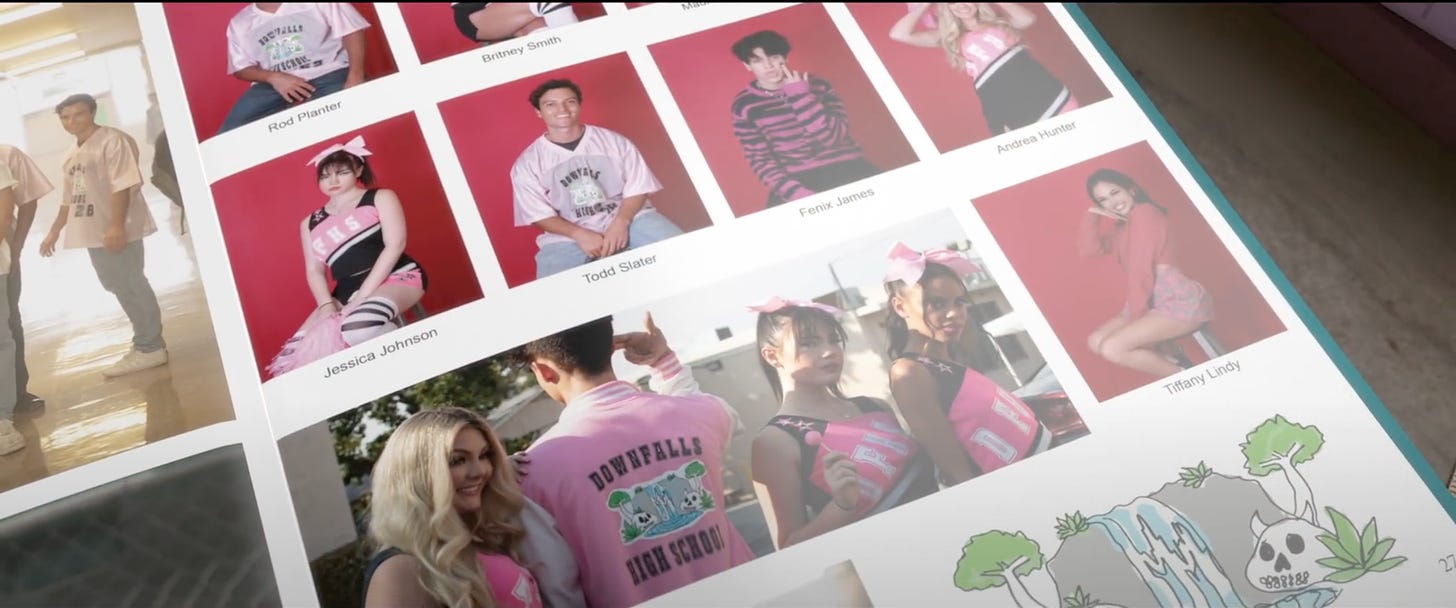
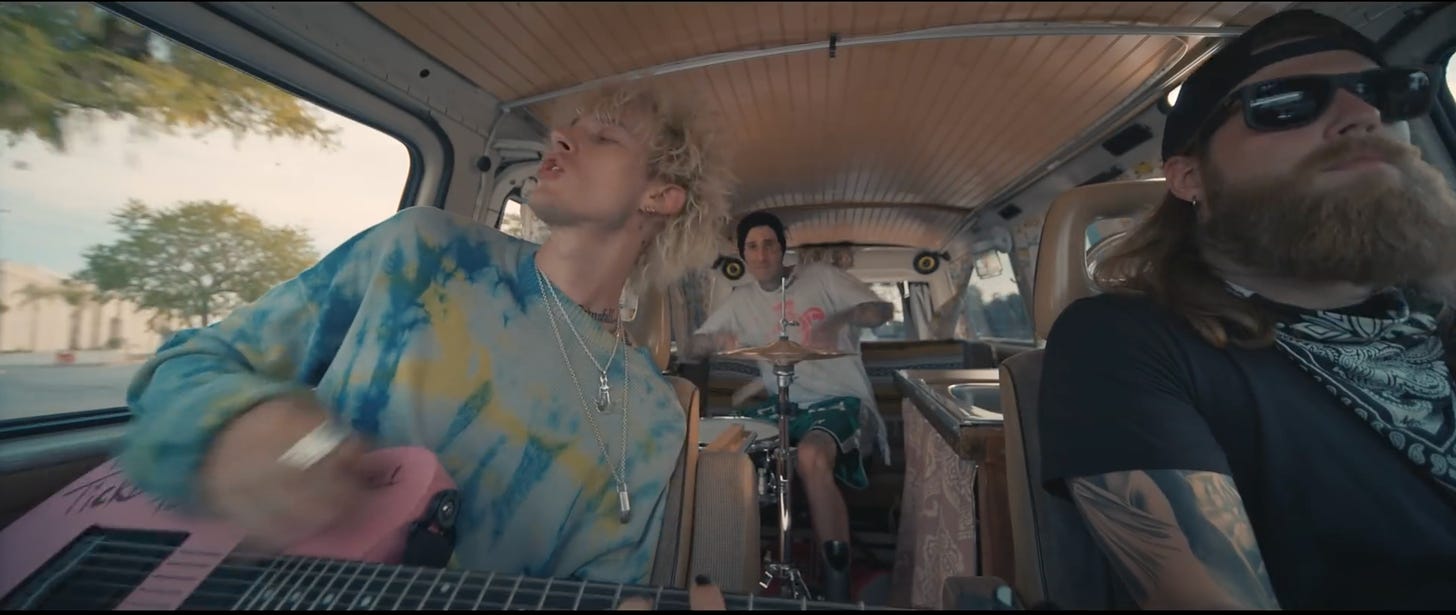
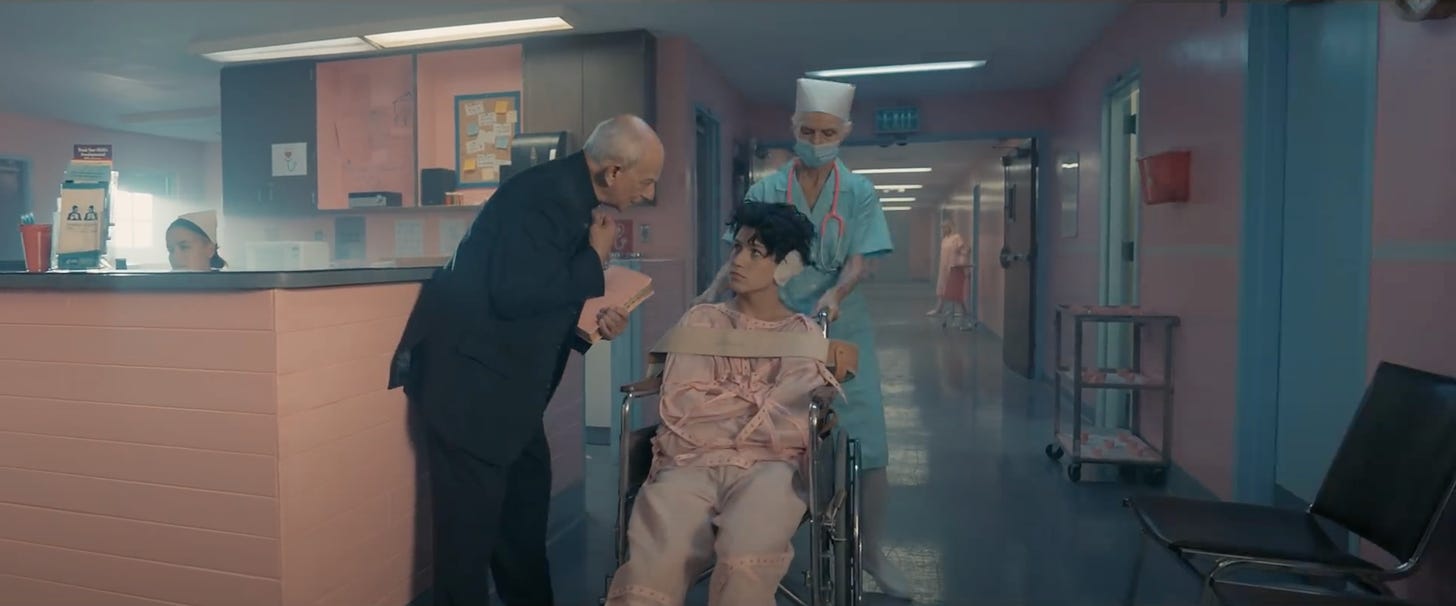
On its opening weekend (online) the musical garnered 16 million views and is now available on YouTube. MGK thanked fans for the insane reception to what he calls “a pop-punk Grease,” commenting “Thanks to everyone who helped us turn the album into its own world and era.”
In an interview with NME, MGK explained:
“I just shot it in four days with Mod Sun. It was my first time directing. It was almost like shooting 14 music videos back-to-back, but with a narrative that’s outside of my personal life stories.
…It focuses on other characters, and then me and [Barker] are just the narrators. It’s an interesting concept because it hasn’t been done for an album ever, maybe outside of like Pink Floyd’s The Wall.”
The ‘Bring-Back-Rock’ Mission
MGK has been explicit that he is trying to ‘bring back rock’n’roll’ stating that “(Tickets to My Downfall) is gonna make the demand for guitar music go up.” He told NME he wants kids to want to pick up a guitar. He wants kids to care about this genre again. The album’s cover is a direct attempt to “make playing guitar cool again.”
‘This album might be the reason why bands of our generation, instead of the Foo Fighters, Green Day or one of those established artists, get to headline Coachella and shit like that—because this album is gonna make the demand for guitar music go up! It’s tapped into the new generation of kids, the 13-to-18-year-olds, that those bands I just named can’t reach at this point.
[…] I get that people are saying: “How the fuck did Machine Gun Kelly make the fucking biggest rock record of the year?” I get that concept sucks for some people, and it may not have been your choice—but it fucking happened.’
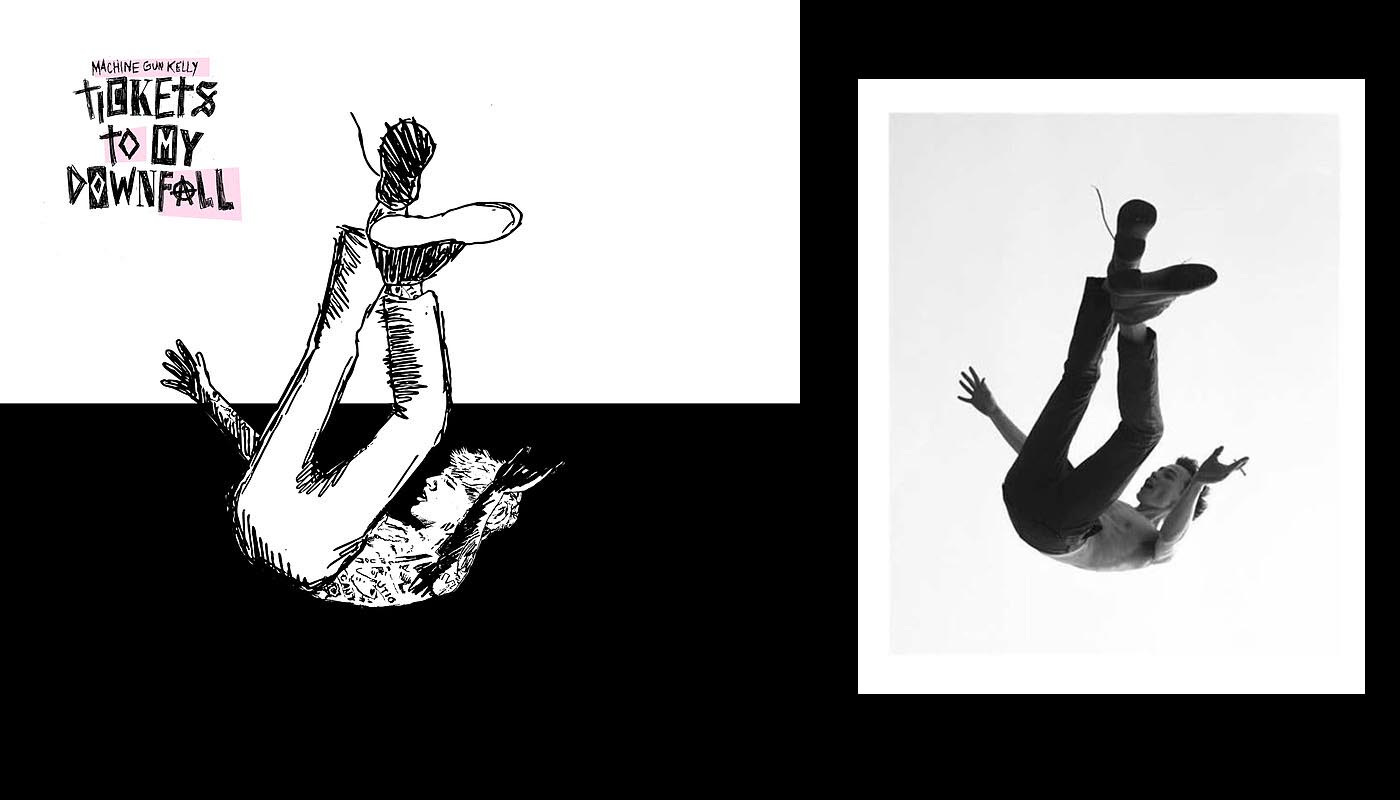
The original album cover for Tickets was an illustration of a person falling (presumably the depiction of a downfall) but, unbeknownst to MGK, was a plagiarism of a photograph by Sen Mitsuji (as pointed out by fans once the album was released.)
MGK released a statement on social media that he “Found out that the album cover I released was essentially copied from a photo we do not own. I didn’t make this design so I apologize to the original artist […] I’m in the process of replacing it right now.”
What replaced it is a photograph of the rapper/musician standing on the edge of an empty backyard California pool, holding his (now signature) pink electric guitar. It was important for him to put out a new image of a musician holding a guitar: “I want young kids to be comfortable to pick up a guitar and try…” He was put off in his early career by not being ‘good’ at guitar:
“Where the fuck was I going to learn how to play like Steve Vai? I couldn’t! I was broke. No-one gave a fuck about me. Give me three chords, though, and tell me to show you how I feel, and I bet you I will… Fuck the people who think that your technicalities are what defines you.”
MGK knows the importance of aesthetics if he is going to accomplish the bring-back-rock mission. In the NME interview, he continues:
“But, honestly, dude, how cool is it that I had to go through so many stages to get to now, where I’m looking at myself like, ‘Oh, this is me’?”
He says there’s something missing from today’s pop culture: “a lead singer with a guitar-playing four-chord pop-punk,” of which he adds, “That’s a missing link in this current day where you can either look like Billie Eilish or A$AP. Where is the pop-punk figure of today?”
Co-Conspirators:
The ‘Rock Revival’ Pow-Wow
His effort to ‘bring rock back’ has not been concocted alone. Co-conspirator Yungblud and MGK have been working together after connecting via a love for the “culture and aesthetic of rock’n’roll” on a mission to “bring rock back for a new generation.”

In the next installment, we go further into the rock revival conspiracy between Yungblud and MGK, and finally reveal how this all connects to Miley Cyrus. Stay tuned for the last episode.


